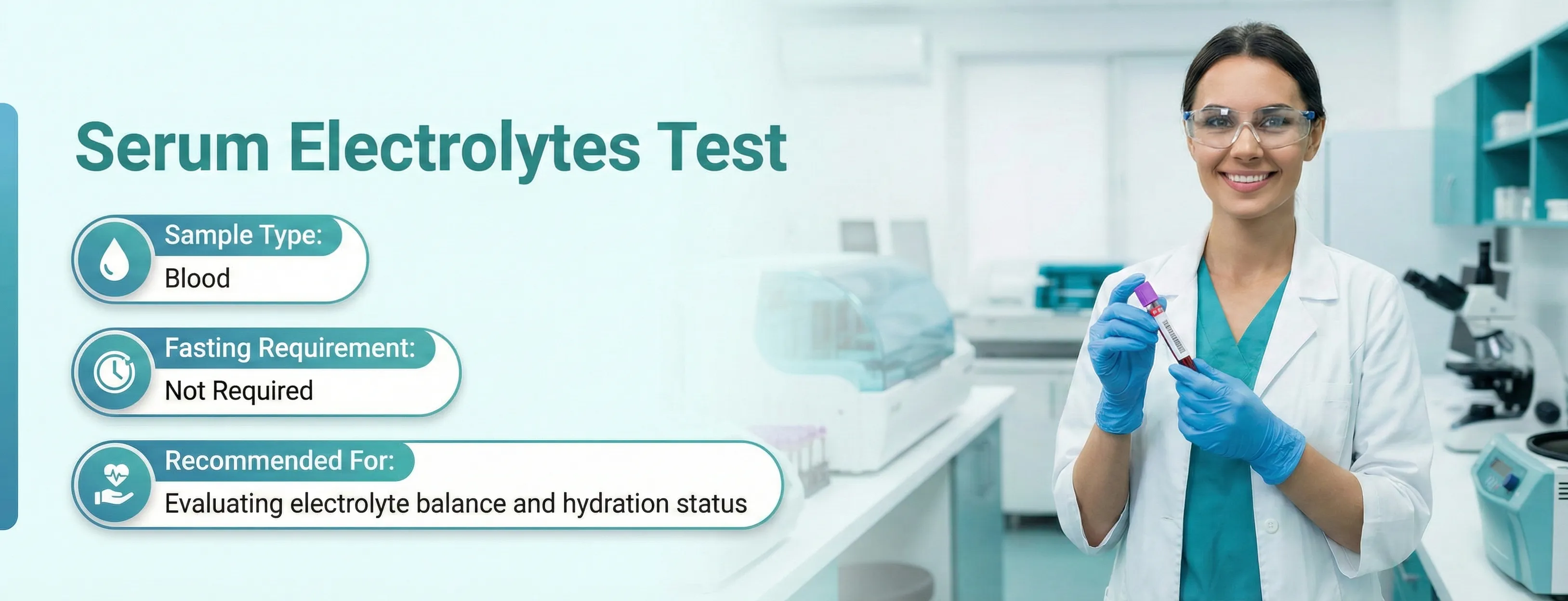2141+ orders placed in your location
100% NABL & ISO Certified Lab • 100% Accurate Reports
Serum Electrolytes Test
Serum electrolyte panel test, Electrolyte panel test
- SummaryThe Serum Electrolytes Test measures the levels of key electrolytes, Sodium (Na), Potassium (K⁺) and Chloride (Cl), to assess fluid balance, heart health, nerve and muscle function, and overall metabolic health. It helps detect dehydration, kidney issues, heart rythm disorders, or electrolyte imbalances. The test requires a blood sample and no fasting. It is suitable for all age groups and genders as advised by a doctor.Read more
- TestsIncludes 3 tests
- Reports Within11 HrsView Sample Report100% NABL & ISO Certified Labs
- SampleBlood
- AgeAll Age Group
- GenderMale and Female
- FastingNot Required
PharmEasy Promises
Know More About The Test
A quick info on Serum Electrolytes
Overview
A Serum Electrolyte Test is a method to screen your blood for an imbalance between your electrolytes. It also helps in measuring acid-base balance and evaluating kidney function. The Serum Electrolyte Test is often included in a routine physical examination and can be performed as a part of several other tests.
A Serum Electrolyte Test is prescribed for people who show signs of weakness, confusion, irregular heartbeat or dehydration. Doctors also prescribe the test to people who come to the emergency room. If the serum electrolyte results show an imbalance in a specific electrolyte, your doctor will test your levels again until it returns to normal.
The result of your Serum Electrolyte Test will help your doctor evaluate acid-base balance in your body. Electrolytes help maintain a balance between acid and bases and governs the movement of fluids in the body.
Electrolytes that are present in our body include phosphate, potassium, sodium, calcium, chloride and magnesium. These charged electrolytes can be found in your body fluids, urine and blood. One also ingests these electrolytes via beverages and food. There are various roles of electrolytes in your body, including conducting nerve impulses, muscle contraction, preventing dehydration and so on.
Your body needs to maintain a balanced level of electrolytes for proper functioning. Electrolyte imbalances can cause severe disorders such as cramps, seizures, cardiac arrest or coma.
In case of an acid-base imbalance, your doctor will carry out further tests to measure acidity and gas levels.
Sample Type
The result of a serum electrolyte panel test is evaluated through a blood sample taken to find the levels of electrolytes present in your circulatory system.
Risk Assessment
Cardiovascular disorders, Kidney disorders, Seizures
What does this test detect?
Some conditions for which a Serum Electrolyte Test can be prescribed are:
- Arrhythmia (irregular heartbeat)
- Kidney diseases
- Lung diseases
- Heart conditions
You may also be recommended to take the Serum Electrolyte Test if you have been prescribed medications such as diuretics (water pills) or angiotensin-converting enzyme inhibitors used to treat high blood pressure. These medications can cause fluctuations in your electrolyte levels.
The Serum Electrolyte Test measures the levels of three electrolytes: Chloride, Sodium, and Potassium.
Indications for Serum Electrolytes Test
A doctor may recommend a Serum Electrolyte Test if a person shows the following symptoms:
- Irregular heartbeat
- Fatigue
- Fast heart rate
- Convulsions or seizures
- Nausea
- Dehydration
- Vomiting
- Diarrhoea or constipation
- Muscle cramps
- Acid-base imbalance
- Lethargy
- Confusion
- Muscle weakness
- Headaches
- Numbness and tingling
The results of your electrolyte panel test can also indicate if ongoing treatment is working for you. For example, in the case of kidney disorders, an electrolyte serum test will help the doctor assess the kidney’s functioning.
Routine Health Check / Preventive Screening
Doctor Recommendation
Follow-up / Monitoring
How frequently should you take this test?
There is no specific frequency. Doctors usually prescribe the Serum Electrolyte Test as part of the metabolic panel test, which is a combination of tests. These tests help them evaluate the essential functions of your body. You can also be prescribed with only a Serum Electrolyte Test in case you show symptoms such as deliriousness, confusion, irregular heartbeat, etc. The Serum Electrolyte Test is also prescribed as part of regular health checkups or to assess your body’s water and pH balance problems.
If you are diagnosed with an electrolyte imbalance, your doctor may recommend taking the serum electrolytes test at regular intervals. This will help them monitor the progress of your condition and evaluate the treatment efficiency. This test is recommended for patients undergoing treatments for kidney disorders, metabolic acidosis or hypertension.
Test Preparation
Before the Test
Usually one doesn't need special preparation for a Serum Electrolytes test. However, if you are undergoing this test alongside another one, your healthcare provider may advise you to fast or avoid certain foods. Do consult a doctor before the test for personalised guidance.
During the Test
When undergoing the Serum Electrolytes test, a blood sample will be taken from a vein in your arm. Here's what you can expect during the test:
- The area where the needle will be inserted will first be cleaned with an antiseptic solution.
- A tourniquet band will be tied to your arm to make your veins pop out.
- A needle will be inserted into the vein to draw the blood. This process may cause a brief pinch lasting a few seconds.
- The blood will be collected in a vial or small test tube, which will be labeled with your details.
After the Test
Following the blood collection:
- A bandage will be placed over the insertion site to halt bleeding.
- There may be minor bruising, although feeling dizzy is uncommon. You may be advised to rest for a few minutes.
- Contact your healthcare provider if you notice bleeding
Parameters
A Serum Electrolyte Test measures the number of electrolytes in your body. The electrolytes measured in the test are:
- Sodium: Sodium is a vital electrolyte that helps your body maintain a balance between your pH and water levels. It also plays a role in cellular metabolism and supports the nerve conduction of nerve impulses. This, in turn, helps in regulating muscle contraction and relaxation. Your body absorbs the required sodium and excretes the rest via the kidneys. Hence, sodium levels can give an idea about your kidney function.
- Potassium: Potassium is an essential electrolyte that participates in several vital functions of the body. It helps in the regulation of fluids present in the body and helps in the homeostasis of pH.
- Chloride: Chloride helps in maintaining the optimum level of electrolytes and fluid in the body. It also functions as a buffer and helps in maintaining pH balance. This electrolyte plays a vital role in producing hydrochloric acid in the stomach. Your kidneys excrete excessive chloride after absorbing an optimal amount.
The Serum Electrolyte Test cannot evaluate organ function or disease. It only indicates some abnormality related to acid base balance in body.. If the serum electrolyte level is higher or lower than the average value, your doctor will prescribe further tests to determine a final diagnosis.
Ranges
Sodium
|
Normal range |
Hyponatremia (low) |
Hypernatremia (high) |
|---|---|---|
|
135-145 mmol/L |
Below 135 mmol/L |
Above 145 mmol/L |
- Hyponatremia indicates that the sodium level is below the normal range.
- Hypernatremia indicates that the sodium level is above the normal range.
Potassium
|
Normal range |
Hypokalemia |
Hyperkalemia |
|---|---|---|
|
3.5-5.1mmol/L |
Below 3.5mmol/L |
Above 5.1 mmol/L |
- Hypokalemia indicates that the potassium level is below the normal range.
- Hyperkalemia indicates that the potassium level is above the normal range.
Chloride
|
Normal range for Adults |
Normal range for Children |
Normal range for Newborns |
|---|---|---|
|
98 to 107 mEq/L |
90 to 110 mEq/L |
96 to 106 mEq/L |
- Chloride level below the normal range is called Hypochloremia.
- A chloride level above the normal range is called Hyperchloremia.
The normal values and reference ranges of the test may vary from lab to lab. Please refer to the ranges mentioned in the report and consult a doctor to understand the interpretation of lab reports.
Test Result Interpretation
The results of the Serum Electrolyte Test will help your doctor diagnose the cause of your symptoms. Abnormal levels of electrolytes can be due to dehydration, heart disease, diabetes, and kidney disease.
Your doctor may order further tests based on which specific electrolyte showed abnormal values in the electrolyte serum test. If your electrolyte levels are not within the normal range, it does not necessarily indicate the presence of a disease.
Your test results also depend on your age, health history, and gender. If you are taking medications such as diuretics, tell your doctor as that can influence your Serum Electrolyte Test values.
Factors such as taking extra fluid, excessive sweating, diarrhoea, or vomiting can influence your electrolyte levels. If the imbalance affects any organ, your doctor will recommend subsequent electrolyte panel tests to monitor the effectiveness of the treatment.
For example, heart failure can cause an electrolyte imbalance. Your doctor may recommend this test to evaluate if the decided treatment is working or not.
Price / Cost
The pricing for a Serum Electrolytes test fluctuates based on the location and the laboratory. Typically, the cost of a Serum Electrolytes test falls within the range of INR 339 to INR 769. Here's a detailed breakdown of the average charges for a Serum Electrolytes test in various major cities across India:
City | Min Price | Average Price | Max Price |
Serum Electrolytes Test Price in Bengaluru | 339 | 554 | 769 |
Serum Electrolytes Test Price in Chennai | 339 | 554 | 769 |
Serum Electrolytes Test Price in Delhi | 339 | 554 | 769 |
Serum Electrolytes Test Price in Hyderabad | 339 | 554 | 769 |
Serum Electrolytes Test Price in Kolkata | 339 | 554 | 769 |
Serum Electrolytes Test Price in Lucknow | 339 | 554 | 769 |
Serum Electrolytes Test Price in Mumbai | 339 | 554 | 769 |
Serum Electrolytes Test Price in Nagpur | 339 | 554 | 769 |
Serum Electrolytes Test Price in Patna | 339 | 554 | 769 |
Serum Electrolytes Test Price in Pune | 339 | 554 | 769 |
Risks and Limitations
The Serum Electrolytes blood test is a common blood test with a very low risk of complications. Seek medical advice right away if you notice-
- Excessive bleeding following the needle insertion.
- Discomfort or swelling at the insertion site.
Limitations of the test
- Negative impact on the outcome of the test due to equipment or human errors.
- Wrong understanding of the markers.
Was This Test Information Helpful?
Please rate your experience
References
People Also Ask
What is the normal range of serum electrolytes?
What is included in the serum electrolytes test?
What does a blood test for electrolytes show?
Can a urine test detect electrolytes?
What would cause electrolytes to be high?
Popular Tests
Have any doubts? Ask us.
Ask us anything about the Serum Electrolytes Test to understand it better
We provide trusted, expert-curated health content to support better awareness,prevention, and care.
Backed by experienced doctors, medical experts, and strict editorial standards.


